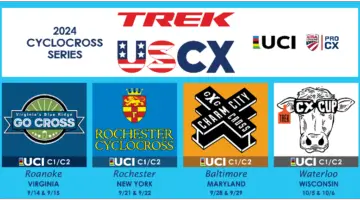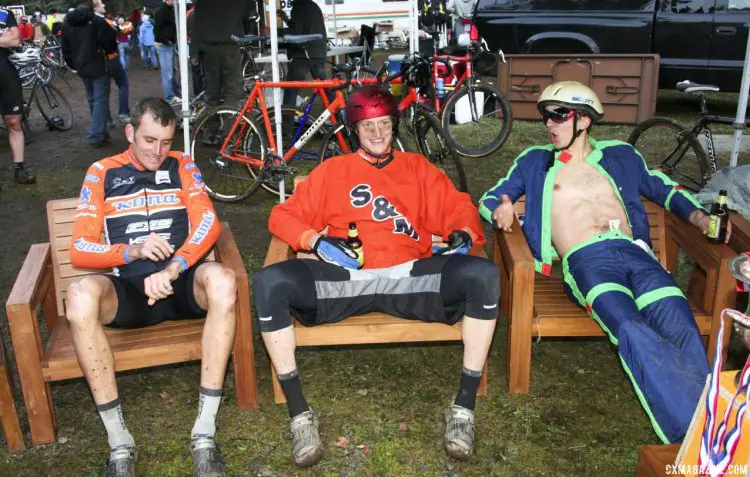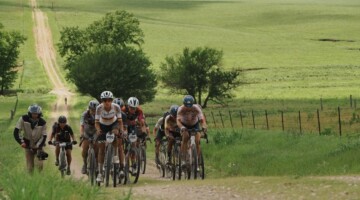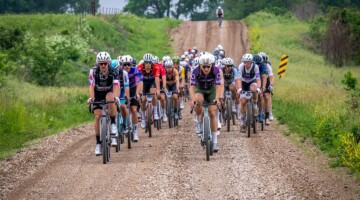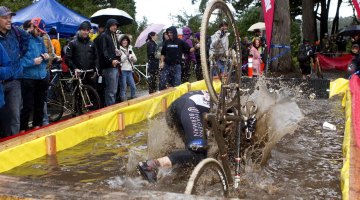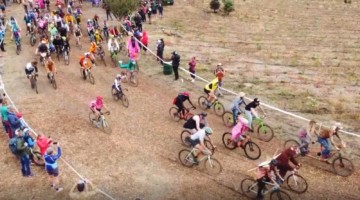Earlier this week, long-time cyclocross pro Ryan Trebon officially announced his retirement with a Tweet. It was a sad day for U.S. cyclocross fans, but a bittersweet day for the tall, Oregon-based racer who had been struggling with injuries. On the day of his announcement, CXM’s Andrew Yee caught up with Trebon by phone to get some insight into the decision to end his career as a professional bike racer.
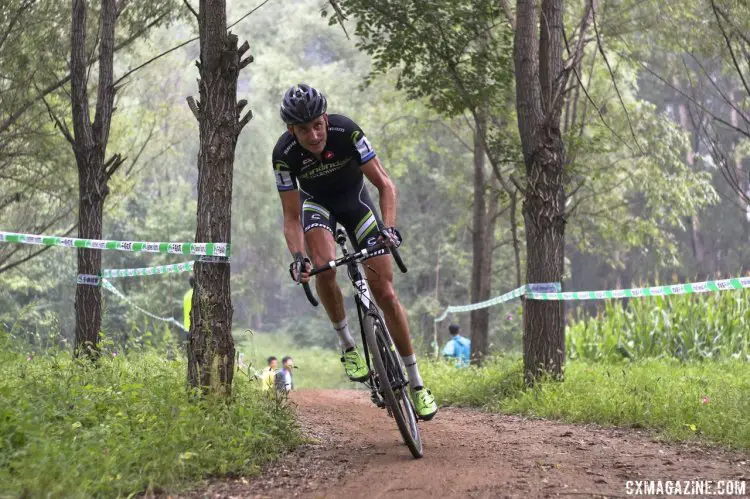
Ryan Trebon with his sights set on his next stage of life. photo: Chasing Thijs Al in China. © Cyclocross Magazine
Cyclocross Magazine: I guess first and foremost, when did you make the decision?
Ryan Trebon: You know, I had probably contemplated it for the last two years I think.
CXM: Really? Because of your injury?
RT: You keep getting injured, and it’s not so much the training that’s hard. I think it’s the coming back from injuries. I finally feel a 100% better from breaking my back from two years ago. I was more wavering on it because I really enjoy racing and I enjoy going to the events, it’s all the other stuff that’s really hard. I found out there’s a big difference being riding and training. And training to compete at a high level is extremely taxing on you. Not only physically but mentally. I didn’t want to keep racing just to keep racing and make a paycheck. I wanted to do it if I could still be competitive and win and I think I am; physically I still think I am there. It’s just hard to kind of wrap your head around the mental aspect of training sometimes.
“I found out there’s a big difference being riding and training. And training to compete at a high level is extremely taxing on you. Not only physically but mentally. I didn’t want to keep racing just to keep racing and make a paycheck.”
It’s been a long decision. I don’t think anybody just decides one day I want to stop doing this. Sometimes it’s like, I want to still do this. No, I think you can convince yourself forever you can keep doing the races. Sometimes it’s better to quit before your expiration date, right?
CXM: Yes. For sure. Was there sometime this summer though where you knew you made the final decision? Or are there days when you still wake up and you’re like, hey I actually could go back and do this.
RT: I mean, I think physically I could easily race and still win races. I go out and ride now and I feel really good on the bike. I’ve still been riding quite a bit, I just enjoy it. I ride and I feel pretty good and I’m like, yes, I want that sensation of racing and being good.
I probably had 12 days in my entire career where I’ve felt like everything’s clicking, and your body is 100% and technically you’re 100%. You feel like your arms and your legs are talking to each other and everything just feels really good. [It] takes so much work to get there. I’m just kind of…You get to the point where you’re like, man I don’t know really if I want to do that work anymore because the suffering is immense to get to a really good level.
I still love the competition stuff. When I was younger I really enjoyed training and seeing what I could do. Seeing what numbers I could get out and the workouts I could do. The workout load, [I] can handle it, but I think as I’ve gotten older that’s not something that gets me excited. I’m still excited about my bike, I’m still real excited to be out on my bike and have fun with it. [Just not] beating myself into the ground constantly.
CXM: I’m actually an [NBA] basketball fan, and my favorite player, Tim Duncan, retired this year. Even though he was 40 years old, he was competing at a pretty high level, but hung it up because he said it started to become less fun. Would you say that’s an accurate description for the overall process of training and racing for you? It’s just less fun?
RT: I mean bike riding’s fun, and bike racing is really fun, it’s just hard work man. It’s hard work getting the best out of yourself. If you truly want to extract everything you have in you it takes a toll, physically and mentally. Every day you wake up and you’re like “Ah, all right man, let’s get ready to suffer.” I go riding now and I was telling people, I told someone, “I feel better on the bike and I feel better about riding because every day I’m not trying to maximize the training, every day I’m not trying to maximize the recovery.” There’s less stuff to worry about and less things to think about, I can go ride my motorcycle for about four hours and feel okay about it and go ride my bike for an hour and a half the next day and I don’t feel bad about it.
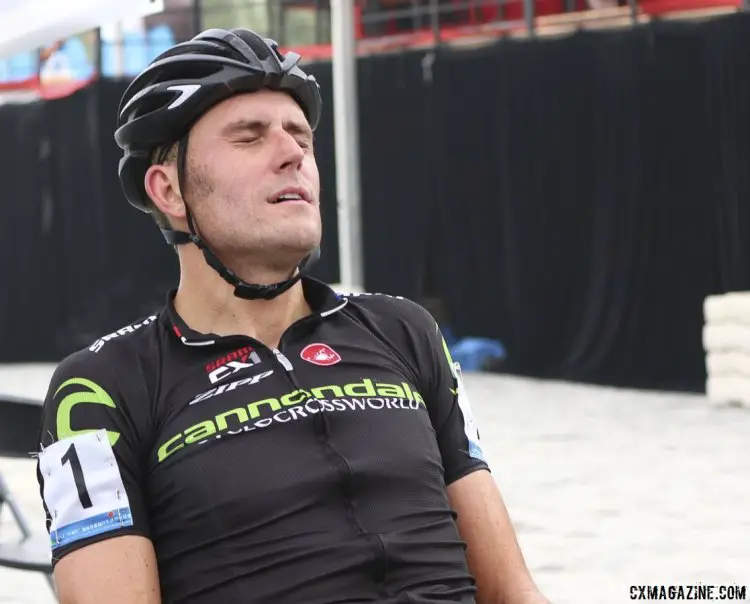
Ryan Trebon calls it a career after an impressive run, and is looking forward to not suffering at this level or sacrificing sight seeing again. photo: Qiansen Trophy, China, 2014. © Cyclocross Magazine
When you’re racing professionally you forgo a lot of things that you want to do but you just go, “I can’t do that because I need to get ready for this.”
“Now it’s like I can go do whatever the hell I want. That’s awesome.”
CXM: That does sound awesome, I’m kinda jealous.
RT: The last month I’ve really become okay with it and relaxed with this new phase of life.
CXM: We talked to you earlier this year and you said you still hadn’t felt really strong on the bike since maybe [finishing second at] 2014 Boulder Nationals. Are you 100% recovered now or will your back never be the same?
RT: I’m sure it’ll never be the same. Once you do a pretty significant amount of damage to your person it’s hard to fully recover from that. I still wake up every day and it’s sore, but I think not racing and not doing the heavy training load has allowed me to recover from it. It’s hard to tell because if I started really training and racing I think it would come up again because it’s just there. It’s never going to go away. I think that stopping is going to be beneficial for me long term health-wise…if I race for two more years, and you get hurt again…it’s a certainty that you’re going to crash, right? It’s just not certain how bad you’re going to crash. I’d rather stop while I’m ahead. My body’s full of scars from the years and so I feel comfortable leaving still halfway intact, you know?
CXM: Yeah, makes sense. As for the decision, back in January you posted publicly that even if you have to sell everything you’ll be back for a season. Is there something in particular that changed since that post?
RT: I wanted to finish racing on my terms. I was bummed that I was never able to win a race after I had gotten injured and I had to miss a year of racing. There’s very few people who are fortunate enough to finish things how they want to, and go out on top, right?
“I wanted to finish racing on my terms. I was bummed that I was never able to win a race after I had gotten injured and I had to miss a year of racing.”
CXM: Right.
RT: Doesn’t happen that often, that’s an anomaly. If you have that expectation for yourself I think you’re naive and not realistic. Sometimes you have to go, “This feels good, I am comfortable with that decision.” Then that’s when you do something. You don’t want to do something that’s like “No, no I’m going to stop when I do this, or after I do this.” Not everybody gets to choose that, you know? There’s very few people [who] get to decide that this is that point, you know? I think [the post] was more me, my kind of defiance of the situation where I’m like, “I can choose to do whatever I want!” Even in six months you gain maturity and have a realization of the world and the way things work.
CXM: Not also racing and being able to reflect on it when your body’s feeling better probably helps too?
RT: Yeah. I mean you can only force things for so long. I have no hard feelings about not racing anymore. I feel more comfortable making that decision than I do racing again.
CXM: I see.
RT: It’ll be hard to watch some of the racing because I like racing and I know all the guys and I really have fun racing. I love attacking, I love dragging it out, following someone’s wheel and I’ve had great races over the years with a bunch of people and that’s the stuff that I’ll miss…but not the travel and not sitting in a hotel room stressing about everything.
CXM: Makes sense. You’ve displayed an incredible amount of running talent, almost running a five-minute mile with very little training. Any chance you’ll dabble in any other sports at a high level?
RT: The only thing to be honest that ever interests me is…I’ll ride my bike, I might do a handful, maybe do local stuff here and there, but I have now realized I will never go back and race another UCI event or a big ’cross race I don’t think ever. I like riding my motorcycle and just having fun. For me always being competitive and having to do that competition doesn’t interest me. I like just doing stuff because I enjoy it, not because it’s like “I need to do a race and beat someone else.” I’ve done a lot of racing in my life, and I still am a competitive person, but that’s more with [my] friends, you go out and you just try to beat up on each other, but toeing the line with the idea of being competitive, I don’t have that [in me] any more I don’t think.
CXM: Does that rule out a Ted King-like retirement where maybe you show up for gravel races and crush everyone there?
RT: I don’t think I’ll crush everyone like Ted, he still seems to still ride a ton… I want to ride my bike now and have fun and I want to ride my motorcycle all fall and have fun. There’s things I would like to do, for me, my interest is more in just…I don’t know yet, honestly I have no idea.
CXM: I saw on Twitter you were giving back to the youth, offering tubular tires to any junior who responded quickly.
First junior man/woman cx'er to reply gets a 2 free sets of tubular tires 1 set dry 1 set mud. Ready GO!!
— Ryan Trebon (@ryantrebon) August 18, 2016
With such a wealth of knowledge in the sport, do you have any formal plans to still be involved in the sport as a mentor or as a coach?
RT: I’ve toyed the idea, not so much of doing training coaching but practical skills stuff with people. I think people spend so much time to get fitter that they don’t learn how to ride faster and I think you can save so much more time technically than you can physically, especially in cyclocross…I don’t know yet, I’ve thought about it but I haven’t really implemented anything on my end yet.
“I think people spend so much time to get fitter that they don’t learn how to ride faster and I think you can save so much more time technically than you can physically, especially in cyclocross…”
I’ve had a few conversations with people about possibly doing something in this sport and stuff but we’ll see, I don’t know. I plan on honestly just taking the next year to not really do anything.
CXM: Sounds amazing.
RT: I’ve been good enough with the money that I made racing that I don’t have to immediately go into working somewhere. It’s a fortunate position to be in and I’m grateful for that and I’m kind of going to dabble into things and see what interests me and then put my purse toward that.
CXM: Sweet. You brought up the money thing and I think a lot of people say there might be maybe six to ten people domestically in the sport who can put together an okay living racing ’cross, if that many. Were finances at all a consideration in retirement? I know you had some offers but, if there was a big offer on the table would that have made a difference?
RT: I would take the proper support structure and program over money any day. If someone offered me a ton of money to race for something that was a shit show and wasn’t well put together and was just a paycheck, that would frustrate me and it wouldn’t be worth it.
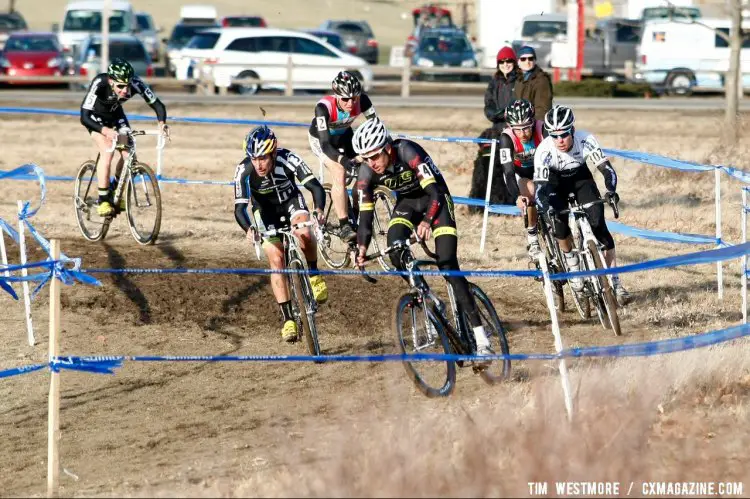
Ryan Trebon had his own program, LTS/Felt for a year, and knows the ins and outs of organizational challenges. photo: leading the 2012 Cyclocross National Championships, Elite Men – © Tim Westmore
If someone offered me five thousand dollars and it was this awesome program and everything was put together, it was super professional and it enabled me to achieve the goals that I wanted, that’s worth it to me more than the money. I’ve never signed with a program for cash, I’ve never [made] sponsorship decisions based strictly on financials. I don’t want to do that. I work with people [who] I want to be around versus working with people just because they’re paying you.
“If someone offered me a ton of money to race for something that was a shit show and wasn’t well put together and was just a paycheck, that would frustrate me and it wouldn’t be worth it.”
The thing with ’cross now is, I had this discussion with someone the other day, I think I was really fortunate to have good periods of racing when there was a lot of excitement and enthusiasm and growth in ’cross and people were putting money into it. ’Cross is still going pretty good I think in the U.S., which is a whole different discussion, but the companies aren’t investing as much into it now as they were. While there’s a lot of really good young talent, there’s no place for them to really go which is unfortunate, you know?
Guys like Barry [Wicks] and myself, Tim [Johnson] and Jeremy [Powers], we all kind of grew up at the same time in ’cross, while it was growing, and it allowed us to kind of get into this position where we are, but now we have really good young riders but companies aren’t investing in the sport outside of…there’s only really two teams out there…two I would consider professional level pro teams out there. Once they’re full, where do you go? Where do people go? There’s not many places for young guys [who] are really good. Like places that Curtis [White] and his sister Emma to really go to outside of [Cannondale p/b CyclocrossWorld] , you know? ’Cross is getting huge in the U.S., with two World Cups this year, but outside of that what do we have?
CXM: Not much, in that there’s no big series. We have a whole bunch of UCI races but no cohesiveness and no big show like the [Saturn] Supercup or USGP in town anymore.
RT: Right. A lot of companies I’ve talked to, and that’s been non industry stuff, non endemic stuff…that’s been the issue, they’re like, “Where do we go to now?”
CXM: Right. Last question about this retirement stuff: I talked to Katerina Nash last fall, and here she is, finishing fifth [in mountain bike] at the Olympics, but at the time she’s like, if I was to summarize, “Nah, I don’t want to go to the Olympics, I’m just doing my own thing, choosing races I’ll enjoy, riding for fun and that helps me race better.” Was there ever a thought that you could kind of take that approach and that type of program to your racing?
RT: Yes and no. Katerina’s an anomaly, she’s phenomenal, she’s a fantastic, I bet she’s probably the most underrated female cyclist in the world. She’s also one of the coolest people I know. She doesn’t get half the credit for the amount of stuff she did.
“I don’t want to just race for the sake of racing. For me racing is to win, it’s not just to be out there and do events and finish tenth place and stuff like that. Every time you line up, it’s to win. Winning is the only thing that you have to race for.”
That’s why I’ve always focused on being like, I’m here to win. I have high expectations of myself, I have high expectations of my mechanic, I have high expectations of all our sponsors. That’s what I want to do. [If] I’m not going to do that, I don’t want to race anymore. I don’t need to go out there. I rode Sunday with my friends the Butlers, and we would ride up Mount Hood, it took five hours and we just had fun, riding bikes and seeing cool shit. Unless you’re an ambassador for a company, you’ve been with them for ten years, there’s not really much future in that stuff, you know?
I think it’s good that companies don’t want to just keep people around riding bikes, I’d rather see them take that money from someone who’s going to do fondos and shit and put it into a 19-year-old and try to develop the next talent, you know, that’s important. That’s way more important than having an ambassador because…I’m comfortable with just riding my bike for fun, buying bikes, going out, doing what I want to do.
CXM: You mentioned always racing to win, and there’s something I’ve always wanted to settle. We were both at the first Singlespeed Cyclocross World Championships in 2007. I was actually in your event, and I had a front row start since they reversed it and I was one of the last qualifiers, but my friend was there watching and taking pictures for us and he said that you three [Wicks, Craig] didn’t really want to win and get the title, the Golden Speedo and the tattoo. Is that true, first of all?
RT: First singlespeed ’cross Worlds in Estacada [Oregon]?
CXM: Yeah, exactly. Were you trying not to win?
RT: I’ve tried not to win two of those now. We definitely tried not to win. I think there was a discussion between us it was like “Ah, okay who’s going to win this one?” Because I didn’t really want a tattoo.
I think when we went to L.A. me and Adam discussed it and I’m just like, “I don’t really want a tattoo either.” Those events are for me… that’s stuff that I would still go out and do because it’s to be out there.
“I’ve tried not to win two of those now.”
[Pauses], Uh, I don’t really have a comment. No comment on the Singlespeed Worlds stuff!
CXM: Well, any chance you will line up for this tenth anniversary back in Portland and either try to win or try not to win?
RT: Maybe. I haven’t registered yet. I thought about it. I thought about it, I might line up for a Cross Crusade here and there. I was thinking about doing the whole series but then I’m just like, “You know I don’t know.” I don’t know, I don’t have any plans yet for this fall.
CXM: You have southern California connections and Florida connections, what’s the timeline and the progression there? Where did you grow up and where do you consider home?
RT: I was a military kid. My dad was in the service for 28 years. I was born in California, my family in terms of the Trebon side of the family is all from San Diego, but my mom and sisters still live in Florida. That was one place we were stationed there so my mom and my sisters still live in Florida and I have friends and family down there. I’m a West Coast kid…I’ve lived in Oregon pretty much since I was able to move away from home.
CXM: Got it. So that’s why you were racing Florida state championships at some point.
RT: Yeah, like in ’98, ’99. That’s where I started racing and living in the Southeast, that’s when I started really racing mountain bikes and stuff like that, so that’s where I kind of got my start into cycling.
CXM: One last question. What will you miss the most about cyclocross racing?
RT: For me the thing I will probably miss the most from racing is not necessary winning, I love good races. I love when you’re out there and you’re racing each other clean but you’re racing each other super hard and attacking and fighting for position. I think racing Powers, I think there’s a handful of times where I can remember like we were racing and it wasn’t…I’ve always enjoyed racing Jeremy because he was never…when you pretend you’re not doing that well but, me and Powers always really liked to race each other. Not just to race to win but just to really race really hard against each other, kind of like man against man. That was fun.
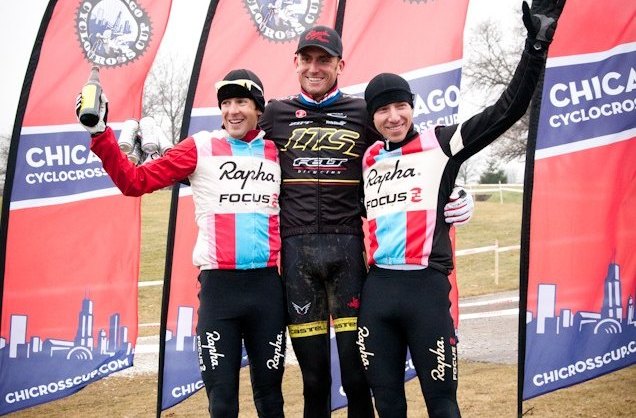
Some of Ryan Trebon’s best memories are of epic battles with Powers. photo: Jones, Trebon and Powers scored the podium spots Saturday in Chicago, December 2011. © Liz Farina Markel
Even the times he’s gotten the better of me while we were doing that, I still enjoyed the shit out of it. That for me is always what I’ve craved, any time I went into a race, it’s just that like, even if [I] lose, I just want to race, I want to be in there and I want to like make attacks, try and cover moves. I think anybody [who] races will tell you that that’s the most exciting part about racing.
When you feel like it was a good race and it gets people watching excited about it as well, that’s what makes the sport good. It’s not just going out there and winning by five minutes. It’s a battle, you know, and that’s exciting. Nobody wants to see a blowout, they want to see a fight and as much as we like winning races we like to really dig deep within ourselves and beat someone.
CXM: It’s totally true. Even if I’m racing for 17th place in the Bs and everything’s going well and I feel like I’m competitive, those are races I enjoy the most.
RT: Exactly.
CXM: Thanks a ton for your time Ryan. Best of luck in the next chapter.
RT: Thank you!
See more on Ryan Trebon’s retirement announcement and career here.











